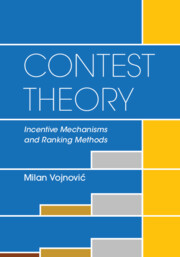Book contents
- Frontmatter
- Contents
- Preface
- 1 Introduction and Preview
- 2 Standard All-Pay Contest
- 3 Rank-Order Allocation of Prizes
- 4 Smooth Allocation of Prizes
- 5 Simultaneous Contests
- 6 Utility Sharing and Welfare
- 7 Sequential Contests
- 8 Tournaments
- 9 Rating Systems
- 10 Ranking Methods
- 11 Appendix
- References
- Index to Notations
- Index
10 - Ranking Methods
Published online by Cambridge University Press: 05 January 2016
- Frontmatter
- Contents
- Preface
- 1 Introduction and Preview
- 2 Standard All-Pay Contest
- 3 Rank-Order Allocation of Prizes
- 4 Smooth Allocation of Prizes
- 5 Simultaneous Contests
- 6 Utility Sharing and Welfare
- 7 Sequential Contests
- 8 Tournaments
- 9 Rating Systems
- 10 Ranking Methods
- 11 Appendix
- References
- Index to Notations
- Index
Summary
In this chapter we consider the problem of ranking alternatives using as input a sequence of rankings of subsets of the alternatives. This problem arises in many situations including that of finding a global ranking of teams in a competition based on observed outcomes in contests involving subsets of teams, e.g., pairs of teams in many popular sports competitions. We may also think of rank aggregation where the goal is to find a consensus ranking for a set of input rankings from different sources, e.g., computing an aggregate ranking given as input a list of top-ranked search results by different search engines. The rank aggregation problem also accommodates the problem of identifying a ground-truth ranking based on noisy input judgments by a panel of experts. For example, such a problem arises in classification of objects that is now commonly performed by less-than-expert workers in paid-labor crowdsourcing online platforms.
We shall first consider the problem of rank aggregation where given a set of input rankings of a set of alternatives, the goal is to find an aggregate ranking of the alternatives that minimizes a given loss function. This optimization-based approach can be seen as finding a global ranking that minimizes the extent of disagreement with the input set of rankings. Specifically, we shall consider the problem of finding an aggregate ranking of alternatives that minimizes the sum of distances to individual input rankings of the alternatives. We shall see that some well-known distances are within a constant factor of each other, e.g., the well-known Kendall's τ and Spearman's Footrule distances. We shall consider the well-known Kemeny rank aggregation where the goal is to find an aggregate ranking of alternatives that minimizes the total number of disagreements of ranking of pairs of alternatives with respect to the input rankings of alternatives. This problem is known to be NP hard. We shall discuss some simple algorithms that guarantee a constant-factor approximation. We shall then consider the problem known as the minimum feedback arc set in tournaments, where the input is a tournament graph defined as a directed graph where there is exactly one directed edge between each pair of vertices, and the goal is to find a linear ordering of vertices that minimizes the number of backward edges.
- Type
- Chapter
- Information
- Contest TheoryIncentive Mechanisms and Ranking Methods, pp. 563 - 616Publisher: Cambridge University PressPrint publication year: 2016
- 2
- Cited by



